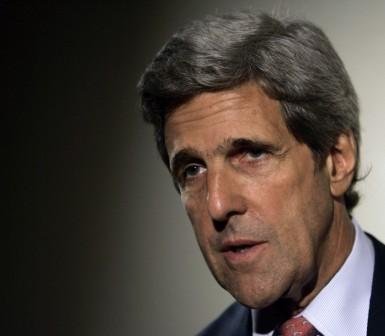
WASHINGTON — In what has become an all-too-familiar sight on Capitol Hill, at least a half-dozen members of the exiled Iranian group Mujahedin-e Khalq, or MEK, arrived at Thursday’s hearing of the House Foreign Affairs Committee, all dressed in their trademark yellow shirts.
For most of the past 15 years, the group had been designated as a terrorist organization by the U.S. government. But in September 2012, as the U.S. prepared to pull troops out of Iraq, then-Secretary of State Hillary Clinton revoked the terrorist designation, part of a diplomatic effort to persuade MEK leadership to begin moving their 3,000-plus members out of Iraq. Ever since the American pullout, the MEK has found itself under threat from Iraqis who vividly recall its decade-long alliance with Saddam Hussein.
MEK members attended Thursday’s hearing to advance a bold proposition: that the thousands of their adherents still living in Iraq should be granted asylum and moved to the United States.
Rep. Dana Rohrabacher (R-Calif.) emerged Thursday as the most vocal proponent of this plan, which was also championed at the hearing by Reps. Ted Poe (R-Texas) and Ileana Ros-Lehtinen (R-Fla.). Rohrabacher aimed his questions at the only witness testifying that day, Secretary of State John Kerry.
“I’ve introduced legislation, H.R. 3707, which would grant asylum to these people in Camp Ashraf, who are obviously in danger,” Rohrabacher said. “Is the administration supporting this concept?”
Kerry sidestepped the question in his typically diplomatic way. “There’s one solution to the problem [of the MEK], and that is that we need to relocate those folks,” he said.
“Can’t we relocate them here? Why not?” Rohrabacher shot back.
“That’s one of the things we’re looking at,” Kerry replied.
Kerry went on to describe a new position he had created within the State Department, that of senior advisor for Mujahedin-e Khalq resettlement. In October of last year, he appointed Jonathan Winer, a longtime Kerry adviser and an expert in international law, to the position.
Rohrabacher’s bill is co-sponsored by many of the same lawmakers who initially backed delisting the MEK from the terrorist roll. As of Thursday, there were 46 co-sponsors.
But administration officials privately suggest that Rohrabacher’s bill, and any other efforts to grant asylum to the MEK in the United States, face nearly insurmountable odds.
“It’s one thing to unfreeze their assets [by removing the terrorist designation], but asylum is a whole different ballgame,” an administration official said, speaking on background to The Huffington Post. To illustrate how limited U.S. asylum policy is in practice, the official noted that out of the more than 135,000 applications received from individuals fleeing Syria’s bloody civil war, only 31 were admitted in the last fiscal year.
“The policy concern with asylum is what kind of precedent that might set for the future. By those standards, the MEK isn’t looking very good,” said the official.
So far, Winer has managed to secure visas from the Albanian government for more than two dozen MEK members.
Other than that, however, it’s been an uphill climb to convince other countries to accept MEK members, due to their cult-like characteristics and near-religious devotion to the Paris-based Maryam Rajavi and her husband, Massoud Rajavi. Under the Rajavis, MEK members have instituted forced celibacy, mandatory divorce and gender segregation, according to a 2009 report from the nonpartisan Rand Corporation. The MEK is also still widely viewed as a militant organization with a “cultic focus on suicide,” wrote the Rand authors, despite the group’s having formally renounced violence in 2003.
But long odds don’t mean the MEK won’t keep trying to gain asylum in the United States. No longer restricted by the terrorist designation, they are now free to spend their millions of dollars — the source of which remains murky — without fear of Treasury Department scrutiny. In 2013, they opened a formal office in a high-rent building on Pennsylvania Avenue and set about expanding their already large cadre of prominent Washington lobbyists.
Around Washington, the MEK is known for having spent millions of dollars on a highly visible advocacy campaign to help secure their delisting as a terrorist organization. To plead their case, the group hired dozens of former administration officials turned government affairs consultants, including Andrew Card, onetime chief of staff to President George W. Bush, and James Jones, former national security advisor to President Barack Obama.
By Christina Wilkie,

